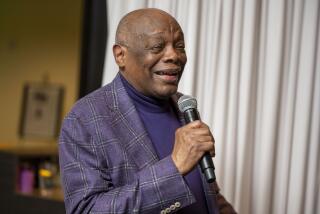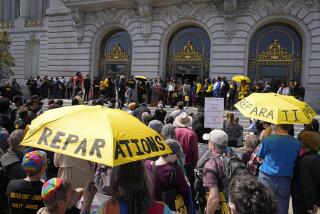Brown gets in the last word on bills
In the Capitol courtyard where Arnold Schwarzenegger once puffed cigars, Gov. Jerry Brown sits in the fall breeze sipping coffee, munching almonds and holding marathon study sessions on hundreds of bills.
One catches his eye: a bid to legalize the stuffing and exhibition of dead mountain lions. He OKs it, even as he scoffs with the weariness of a headmaster convinced his students haven’t learned much.
“This presumably important bill earned overwhelming support by both Republicans and Democrats,” Brown writes in his signing message. “If only that same energetic bipartisan spirit could be applied to creating clean energy jobs and ending tax laws that send jobs out of state.”
Brown is smarting from a legislative session marked by partisan brinkmanship and deep cuts in state services. His pronouncements are a window on both his hands-on governing style and his deep frustration with a strong-willed Legislature that has made the former two-term governor’s return to Sacramento a bumpy one.
As Sunday’s deadline for bill action nears, Brown is holding what is, in essence, an outdoor legislative salon, according to his aides. From his perch on a wrought-iron lawn chair, he quizzes a small group of advisors, including his wife, Anne, on the merits of various proposals while his dog Sutter sits nearby, begging for attention.
“He is a questioner,” said Nancy McFadden, Brown’s top policy aide. “It’s like you’re preparing for your Socratic session with your law professor. You always get asked the question for which you don’t have the answer.”
In those cases, Brown grabs his iPhone. Past governors may have delegated such stuff to staff, but this one is a micro-manager who direct-dials many of the contacts he has amassed during a lifetime in politics.
“Hello, this is Jerry Brown,” he says. “Do you have a minute?”
Before vetoing a bill that would have allowed tens of thousands of California child-care workers to unionize, aides said, he called the governors of Maryland and Illinois, which have passed similar measures. Considering a number of gun-control bills, he reached out to sheriffs, police chiefs — even a homicide detective he knew from his days as mayor of Oakland. Pondering a proposal to ban minors from tanning beds, he called his own dermatologist, who counseled against such exposure.
What a difference an administration makes. According to former aides, Schwarzenegger weighed in on only the most controversial measures. No fan of the capital, he had boxes of bills flown to his Brentwood mansion for his own brand of open-air review.
“It wouldn’t be unusual to sit by the pool and take cigar breaks,” said Rob Stutzman, a former Schwarzenegger advisor. “It’s the California governor, man.”
Schwarzenegger trusted aides to craft his veto messages, making only occasional changes on high-profile bills.
In 2009, Schwarzenegger released a memorable message. He used a vulgar acrostic to reject a bill by Assemblyman Tom Ammiano (D-San Francisco), who had heckled the Republican governor for crashing a Democratic fundraiser. The second line of the message began with the letter “f”; the last line began with the letter “u.” Schwarzenegger’s aides still maintain — with a wink — that the kiss-off was coincidental.
Brown leaves no room for ambiguity. He is a meticulous draftsman, carefully editing every line with a black Uni-Ball pen. One of his veto drafts was almost entirely crossed out, and a staffer’s long, bureaucratic explanation was replaced with a more succinct, handwritten “That’s not a good idea.”
Advisors have stopped printing the messages on official stationery. “We know we’ll go through at least two drafts,” McFadden said.
Sometimes Brown wields his pen against what he views as unnecessary regulation. Spurning a measure to impose a $25 fine on people whose kids ski or snowboard without a helmet, he ruminated on the relationship between citizens and their government.
“I am concerned about the continuing and seemingly inexorable transfer of authority from parents to the state,” he wrote. “Not every human problem deserves a law.”
He also remembers Republicans who stymied his efforts to plug California’s budget hole this year with a ballot measure on new taxes. Vetoing a bill by state Sen. Tom Harman (R-Huntington Beach) that would have required the state to give notice of planned park closures, Brown mocked the measure as unnecessary.
“What the parks do need is sufficient funding to stay open — something I feel compelled to note the author and his colleagues refused to let the people vote on,” he wrote. (Harman took to Twitter, calling the veto “retaliatory politics.”)
Approving a measure by Sen. Anthony Cannella (R-Ceres) that imposes a fee on olive-tree sales to fund agricultural research, Brown similarly chided: “The author vouches for this fee by stressing the need to ensure that olives are ‘healthy and viable for California farmers.’ I agree.
“Perhaps the author and his colleagues might apply the same solicitude — and revenue — to ensure the health and viability of our schools?” the governor continued. “Just a thought.”
More to Read
Start your day right
Sign up for Essential California for news, features and recommendations from the L.A. Times and beyond in your inbox six days a week.
You may occasionally receive promotional content from the Los Angeles Times.






